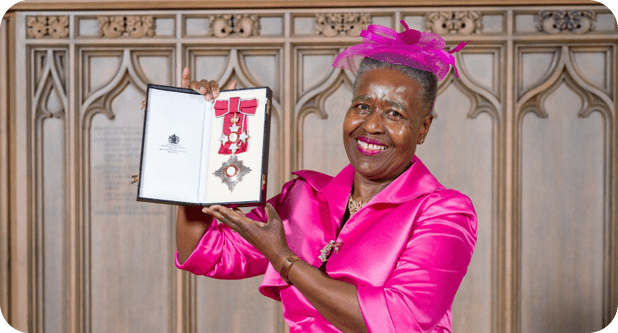In Conversation with Dame Neslyn Watson-Druée: Social Identity in Courage Leadership

The idea of leadership changes at the same pace society is changing. If we consider the most essential dimensions of leadership, the past and the future, social identity and courage are essential for fostering inclusion, adaptability and resilience within organisations and society. Reflecting on the courage of a leader from the past, Martin Luther King, Jr, comes to mind.

His courage transformed not only the past leadership but shaped the future of leadership forever- “a promise that all men, yes, black men as well as white men, would be guaranteed the “unalienable Rights” of “Life, Liberty and the pursuit of Happiness.” – Martin Luther King, Jr. I Have a Dream, 28 August 1963, Washington D.C.
Research increasingly shows that leaders who create a shared sense of identity within their teams foster a stronger commitment, trust and collaborative environment, which significantly improves team performance and cohesion. Known as “social identity leadership,” is grounded in representing and enhancing the collective identity of a group rather than focusing solely on personal authority or individual attributes.
A 2024 meta-analysis revealed that social identity is the fabric of social integration, influencing everything from well-being to adaptability in multicultural contexts. In previous conversations with Dame Neslyn we looked into what courageous leaders do differently. Leaders who embrace this approach, creating a collective “we” identity, encourage greater unity and a sense of purpose, which is especially valuable in diverse and changing environments. Leaders who advance the group’s identity rather than merely embodying it inspire their teams to engage in behaviours that align with shared goals and values.
Recent studies also highlight how “identity leadership” positively affects group-based pride, which in turn strengthens overall team performance. For example, leaders who skillfully blend political awareness with a shared group identity enable their teams to perform better by fostering pride in shared achievements, which boosts morale and motivation.
I like to believe that cultivating courageous leadership through a social identity approach is linked to qualities like humility and empowerment and this is the foundation for what I call social courage leadership. Leaders who critically examine their own social identity inspire trust and loyalty, which empowers others and promotes an inclusive atmosphere where team members feel valued and motivated.
This model of leadership—focused on humility, courage and collective identity—has been shown to drive meaningful engagement and equity in organisations, encouraging leaders to lift up their teams while fostering resilience in the face of societal shifts. Our latest conversation with Dame Neslyn, who shaped the future of many generations of courageous leaders, is looking into the courage and social identity of leadership.
How can leaders use social identity to create a sense of shared purpose in teams, especially in diverse or multicultural settings?
Courageous leadership in today’s context is about aligning personal identity with collective goals, enabling leaders to inspire and lead effectively through times of change. By fostering a shared social identity, leaders can harness the power of their teams to navigate challenges, adapt to new cultural dynamics, and build a workplace culture rooted in trust and mutual respect.
Leaders can use social identity as a unifying force by building a “we” culture that resonates across diverse backgrounds. Studies have shown that when leaders emphasise shared values and goals, teams feel a stronger connection and dedication to collective success. For example, in multicultural teams, creating identity-based sub-goals that all members can relate to fosters inclusivity while allowing unique cultural perspectives to shape the group’s broader identity. Leaders who cultivate a sense of shared purpose, even in diverse settings, enhance collaboration and trust.
What role does social identity play in leadership when facing significant change?
Social identity is essential for building resilience because it helps team members view challenges through a collective lens, which can lessen individual stress. When team members see themselves as part of a cohesive group, they are more likely to support one another and adapt as a unit to shifting circumstances. A study on organizational resilience highlighted that teams with a strong sense of social identity were more adaptable to changes such as remote work transitions or organizational restructuring. When reinforcing a shared identity, leaders can foster a group mindset that promotes stability and collective problem-solving.
How do leaders balance personal values with the collective identity of their teams when addressing complex social issues?
Balancing personal values with group identity can be challenging, especially when facing social issues that evoke strong individual beliefs. Courageous leaders approach this by using empathy and dialogue, creating spaces where team members can express their views without judgment.
A recent survey on values-based leadership found that leaders who openly share their values while inviting team input create a culture of trust and mutual respect. By framing decisions around shared organizational values rather than individual beliefs, leaders can align personal values with the team’s identity, maintaining coherence and inclusivity.
In what ways can a leader’s understanding of their own social identity impact their ability to lead with courage?
Leaders who understand their social identity—how their background, experiences and privileges shape their worldview—often exhibit greater humility and self-awareness. This awareness can encourage them to lead more authentically, admitting when they need input or are uncertain.
Studies have shown that leaders who recognize their social identity are more inclusive, using their understanding to bridge divides and encourage open communication. Such leaders model courage by acknowledging their limitations and showing vulnerability, which fosters a culture of transparency and growth.
How can leaders use social identity to empower marginalized or underrepresented voices within their organizations?
Leaders can leverage social identity to empower marginalized voices by intentionally creating sub-groups or forums where underrepresented team members can connect and share their perspectives. Research suggests that when leaders reinforce the value of diverse identities, team members from marginalized backgrounds feel more empowered and engaged. By recognizing these distinct identities as vital to the team’s collective success, leaders can ensure that all voices contribute meaningfully to the organization. Empowering diverse voices fosters innovation and inclusivity, as each team member feels respected and integral to the team’s identity and goals.
Could you share with our readers a few practical tips for leading with courage through a social identity framework in a changing society?
I will start by saying that cultivating a shared identity starts with fostering “We” language. Emphasising collective goals and values helps bridge individual differences and builds a sense of belonging within teams. Using “we” language reinforces this collective identity, making team members feel part of a larger purpose. It is known that leaders who actively create a shared identity boost trust, unity and motivation within their teams.
Secondly, leaders can encourage dialogue on personal and group identities. Invite team members to share aspects of their personal identities that they believe enrich the group’s collective identity. This open exchange fosters mutual respect and helps individuals feel valued for their unique contributions. Studies show that leaders who create spaces for team members to discuss their backgrounds and experiences enable deeper trust and inclusion.
Thirdly, a courageous leader will align organisational vision with inclusive practices. For an organisation to evolve, its vision must reflect diverse perspectives, allowing people to connect their individual goals with the team’s broader mission. Leaders can accomplish this by incorporating diversity and inclusion into strategic decisions and recognizing the importance of varied social identities within the organisation.
At my upcoming workshop we will go deeper into more option but I need to mention that a courageous leader is ready to model self-awareness and vulnerability. Acknowledging your own social identity and how it influences your worldview and biases. When modelling this awareness, you demonstrate humility and open-mindedness, making it easier for others to feel safe sharing their unique perspectives. Research on “identity leadership” confirm that leaders who are aware of and communicate their own social identities create environments of trust and psychological safety.
Finally, I want to leave you with a thought that guided my own leadership: Value diverse identities to empower marginalised voices. Actively empower underrepresented voices by creating pathways for participation, such as focus groups or mentorship programs. Recognize and celebrate diverse contributions, ensuring they are seen as integral to the team’s success. Empowerment not only supports inclusivity but also strengthens the team’s overall resilience, making the organisation more adaptable and innovative in changing times.
We thank Dame Neslyn for her contribution to courage leadership and reflecting on “the fierce urgency of Now”. We believe that her unique approach to the future of leadership together with these practices help leaders to create a resilient, inclusive environment where every team member feels valued and encouraged to contribute fully.
About Dame Neslyn Watson-Druée
Dame Neslyn Watson-Druée, CBE provides coaching to executive and senior leaders, enabling them the space to be their best in their leadership, achieve high performance, and transform their business and life with integrity, passion, vision and emotional intelligence. Dame Neslyn Watson-Druée started her business as a leadership development coach and consultant in 1989
She also developed a leadership demonstration programme for the Executive of the British National Health Service (NHSE) in 1993. She has received now received over 25 awards for her work, inclusive of being honoured four times by Her Majesty Queen Elizabeth and King Charles III of the United Kingdom and the Commonwealth.
Grab your place at the next Workshop with Dame Neslyn– Leading with Courage- taking place on 23 November 2024. This virtual workshop is aimed at empowering you to cultivate courage in your leadership journey. The event will offer interactive sessions, case studies from courageous leaders, reflective exercises and a live Q&A.
Dame Neslyn Watson-Druée Team
Do you want to share your story and inspire our readers ? Know that YOUR EXPERTISE is paving the way for a fairer, happier society.



